University Project Management Reflection Report: PROJ 6000
VerifiedAdded on 2022/08/28
|10
|2097
|17
Journal and Reflective Writing
AI Summary
This reflective report analyzes the project management knowledge gained throughout a course, focusing on the application of PMBOK knowledge areas and process groups. It explores the importance of effective project management practices, including clear communication, detailed planning, and risk management, to enhance project success rates. The report examines project team competencies, emphasizing the significance of a competent team capable of addressing project issues. It also provides a critical analysis of factors contributing to project success, such as time management, stakeholder needs identification, and change management. Furthermore, the report uses the case of "Singular Logic" to illustrate the practical application of project management principles and tools. In conclusion, the report highlights the key elements of successful project implementation, including risk management, scope management, and the management of time and cost, and how these elements contribute to overall project success.

Running head: PM
Reflection
Name of Student
Name of University
Author Note
Reflection
Name of Student
Name of University
Author Note
Paraphrase This Document
Need a fresh take? Get an instant paraphrase of this document with our AI Paraphraser
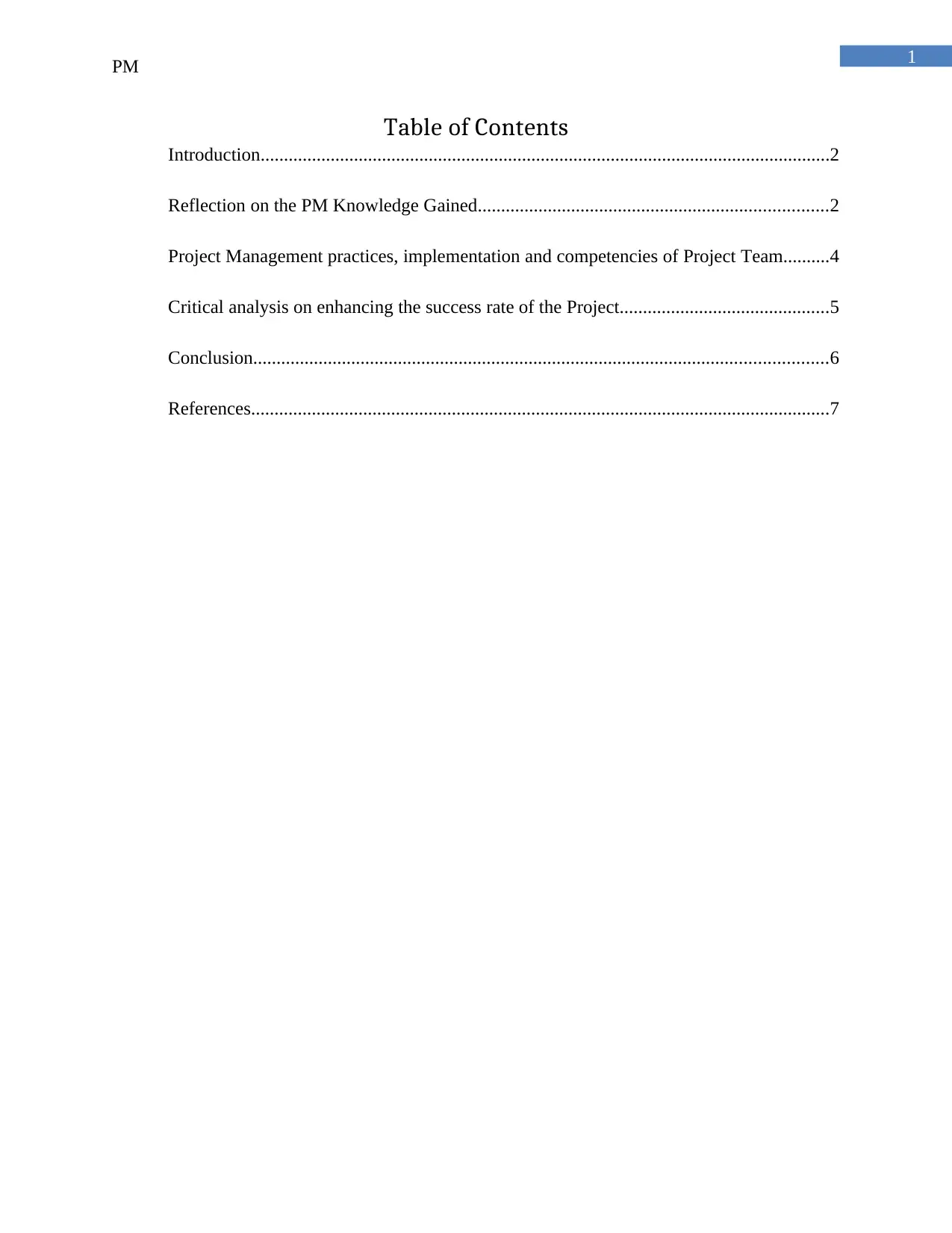
1
PM
Table of Contents
Introduction..........................................................................................................................2
Reflection on the PM Knowledge Gained...........................................................................2
Project Management practices, implementation and competencies of Project Team..........4
Critical analysis on enhancing the success rate of the Project.............................................5
Conclusion...........................................................................................................................6
References............................................................................................................................7
PM
Table of Contents
Introduction..........................................................................................................................2
Reflection on the PM Knowledge Gained...........................................................................2
Project Management practices, implementation and competencies of Project Team..........4
Critical analysis on enhancing the success rate of the Project.............................................5
Conclusion...........................................................................................................................6
References............................................................................................................................7
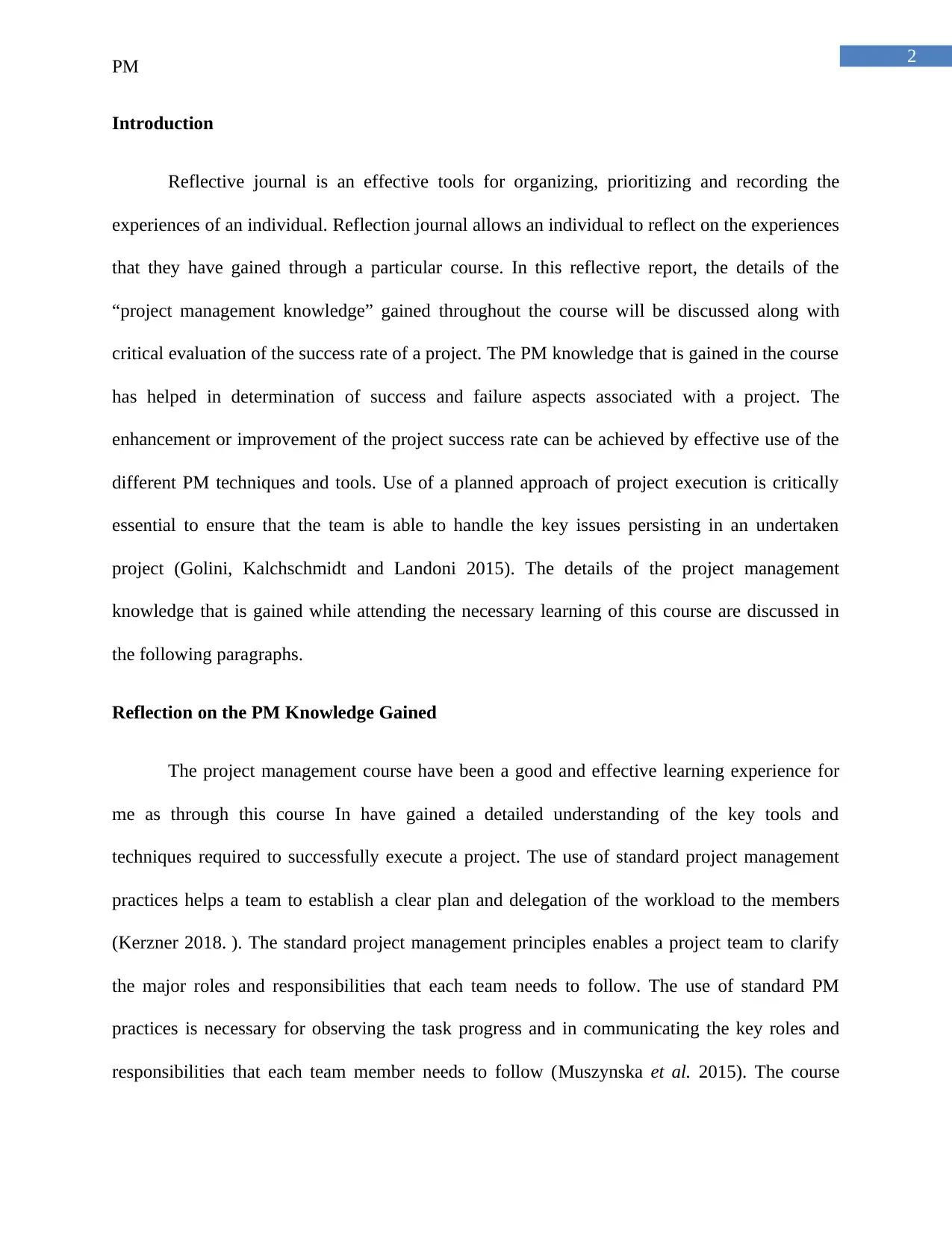
2
PM
Introduction
Reflective journal is an effective tools for organizing, prioritizing and recording the
experiences of an individual. Reflection journal allows an individual to reflect on the experiences
that they have gained through a particular course. In this reflective report, the details of the
“project management knowledge” gained throughout the course will be discussed along with
critical evaluation of the success rate of a project. The PM knowledge that is gained in the course
has helped in determination of success and failure aspects associated with a project. The
enhancement or improvement of the project success rate can be achieved by effective use of the
different PM techniques and tools. Use of a planned approach of project execution is critically
essential to ensure that the team is able to handle the key issues persisting in an undertaken
project (Golini, Kalchschmidt and Landoni 2015). The details of the project management
knowledge that is gained while attending the necessary learning of this course are discussed in
the following paragraphs.
Reflection on the PM Knowledge Gained
The project management course have been a good and effective learning experience for
me as through this course In have gained a detailed understanding of the key tools and
techniques required to successfully execute a project. The use of standard project management
practices helps a team to establish a clear plan and delegation of the workload to the members
(Kerzner 2018. ). The standard project management principles enables a project team to clarify
the major roles and responsibilities that each team needs to follow. The use of standard PM
practices is necessary for observing the task progress and in communicating the key roles and
responsibilities that each team member needs to follow (Muszynska et al. 2015). The course
PM
Introduction
Reflective journal is an effective tools for organizing, prioritizing and recording the
experiences of an individual. Reflection journal allows an individual to reflect on the experiences
that they have gained through a particular course. In this reflective report, the details of the
“project management knowledge” gained throughout the course will be discussed along with
critical evaluation of the success rate of a project. The PM knowledge that is gained in the course
has helped in determination of success and failure aspects associated with a project. The
enhancement or improvement of the project success rate can be achieved by effective use of the
different PM techniques and tools. Use of a planned approach of project execution is critically
essential to ensure that the team is able to handle the key issues persisting in an undertaken
project (Golini, Kalchschmidt and Landoni 2015). The details of the project management
knowledge that is gained while attending the necessary learning of this course are discussed in
the following paragraphs.
Reflection on the PM Knowledge Gained
The project management course have been a good and effective learning experience for
me as through this course In have gained a detailed understanding of the key tools and
techniques required to successfully execute a project. The use of standard project management
practices helps a team to establish a clear plan and delegation of the workload to the members
(Kerzner 2018. ). The standard project management principles enables a project team to clarify
the major roles and responsibilities that each team needs to follow. The use of standard PM
practices is necessary for observing the task progress and in communicating the key roles and
responsibilities that each team member needs to follow (Muszynska et al. 2015). The course
⊘ This is a preview!⊘
Do you want full access?
Subscribe today to unlock all pages.

Trusted by 1+ million students worldwide
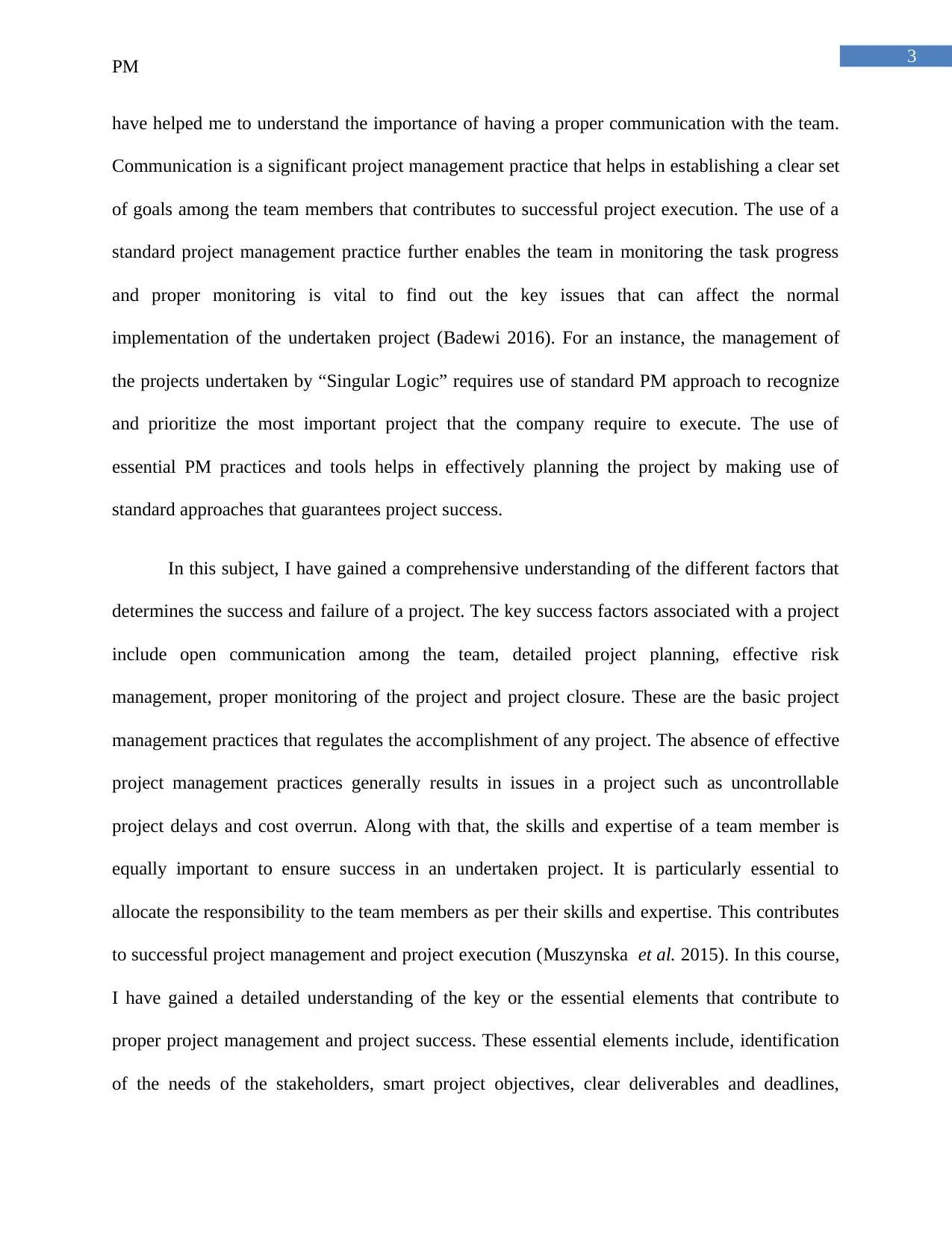
3
PM
have helped me to understand the importance of having a proper communication with the team.
Communication is a significant project management practice that helps in establishing a clear set
of goals among the team members that contributes to successful project execution. The use of a
standard project management practice further enables the team in monitoring the task progress
and proper monitoring is vital to find out the key issues that can affect the normal
implementation of the undertaken project (Badewi 2016). For an instance, the management of
the projects undertaken by “Singular Logic” requires use of standard PM approach to recognize
and prioritize the most important project that the company require to execute. The use of
essential PM practices and tools helps in effectively planning the project by making use of
standard approaches that guarantees project success.
In this subject, I have gained a comprehensive understanding of the different factors that
determines the success and failure of a project. The key success factors associated with a project
include open communication among the team, detailed project planning, effective risk
management, proper monitoring of the project and project closure. These are the basic project
management practices that regulates the accomplishment of any project. The absence of effective
project management practices generally results in issues in a project such as uncontrollable
project delays and cost overrun. Along with that, the skills and expertise of a team member is
equally important to ensure success in an undertaken project. It is particularly essential to
allocate the responsibility to the team members as per their skills and expertise. This contributes
to successful project management and project execution (Muszynska et al. 2015). In this course,
I have gained a detailed understanding of the key or the essential elements that contribute to
proper project management and project success. These essential elements include, identification
of the needs of the stakeholders, smart project objectives, clear deliverables and deadlines,
PM
have helped me to understand the importance of having a proper communication with the team.
Communication is a significant project management practice that helps in establishing a clear set
of goals among the team members that contributes to successful project execution. The use of a
standard project management practice further enables the team in monitoring the task progress
and proper monitoring is vital to find out the key issues that can affect the normal
implementation of the undertaken project (Badewi 2016). For an instance, the management of
the projects undertaken by “Singular Logic” requires use of standard PM approach to recognize
and prioritize the most important project that the company require to execute. The use of
essential PM practices and tools helps in effectively planning the project by making use of
standard approaches that guarantees project success.
In this subject, I have gained a comprehensive understanding of the different factors that
determines the success and failure of a project. The key success factors associated with a project
include open communication among the team, detailed project planning, effective risk
management, proper monitoring of the project and project closure. These are the basic project
management practices that regulates the accomplishment of any project. The absence of effective
project management practices generally results in issues in a project such as uncontrollable
project delays and cost overrun. Along with that, the skills and expertise of a team member is
equally important to ensure success in an undertaken project. It is particularly essential to
allocate the responsibility to the team members as per their skills and expertise. This contributes
to successful project management and project execution (Muszynska et al. 2015). In this course,
I have gained a detailed understanding of the key or the essential elements that contribute to
proper project management and project success. These essential elements include, identification
of the needs of the stakeholders, smart project objectives, clear deliverables and deadlines,
Paraphrase This Document
Need a fresh take? Get an instant paraphrase of this document with our AI Paraphraser
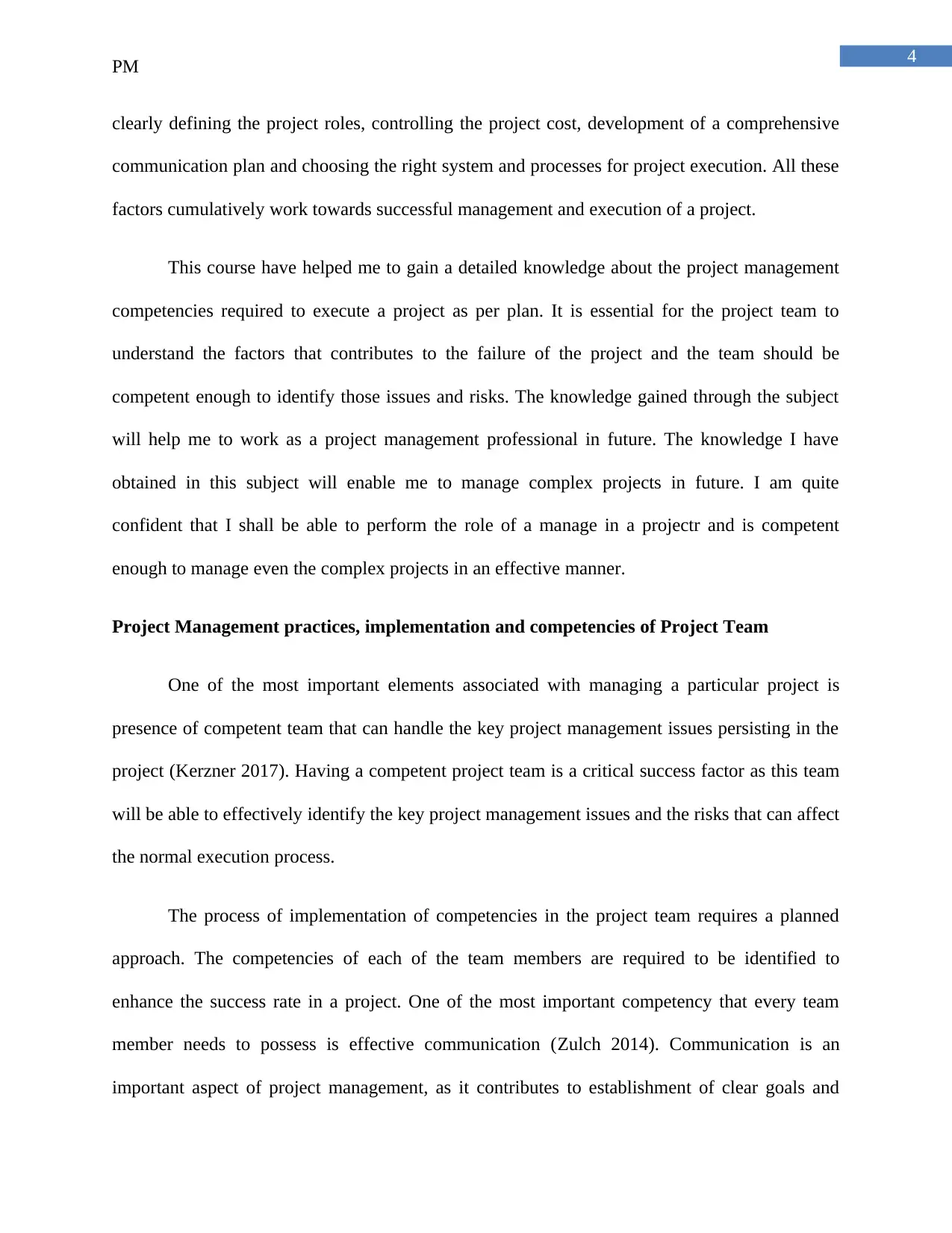
4
PM
clearly defining the project roles, controlling the project cost, development of a comprehensive
communication plan and choosing the right system and processes for project execution. All these
factors cumulatively work towards successful management and execution of a project.
This course have helped me to gain a detailed knowledge about the project management
competencies required to execute a project as per plan. It is essential for the project team to
understand the factors that contributes to the failure of the project and the team should be
competent enough to identify those issues and risks. The knowledge gained through the subject
will help me to work as a project management professional in future. The knowledge I have
obtained in this subject will enable me to manage complex projects in future. I am quite
confident that I shall be able to perform the role of a manage in a projectr and is competent
enough to manage even the complex projects in an effective manner.
Project Management practices, implementation and competencies of Project Team
One of the most important elements associated with managing a particular project is
presence of competent team that can handle the key project management issues persisting in the
project (Kerzner 2017). Having a competent project team is a critical success factor as this team
will be able to effectively identify the key project management issues and the risks that can affect
the normal execution process.
The process of implementation of competencies in the project team requires a planned
approach. The competencies of each of the team members are required to be identified to
enhance the success rate in a project. One of the most important competency that every team
member needs to possess is effective communication (Zulch 2014). Communication is an
important aspect of project management, as it contributes to establishment of clear goals and
PM
clearly defining the project roles, controlling the project cost, development of a comprehensive
communication plan and choosing the right system and processes for project execution. All these
factors cumulatively work towards successful management and execution of a project.
This course have helped me to gain a detailed knowledge about the project management
competencies required to execute a project as per plan. It is essential for the project team to
understand the factors that contributes to the failure of the project and the team should be
competent enough to identify those issues and risks. The knowledge gained through the subject
will help me to work as a project management professional in future. The knowledge I have
obtained in this subject will enable me to manage complex projects in future. I am quite
confident that I shall be able to perform the role of a manage in a projectr and is competent
enough to manage even the complex projects in an effective manner.
Project Management practices, implementation and competencies of Project Team
One of the most important elements associated with managing a particular project is
presence of competent team that can handle the key project management issues persisting in the
project (Kerzner 2017). Having a competent project team is a critical success factor as this team
will be able to effectively identify the key project management issues and the risks that can affect
the normal execution process.
The process of implementation of competencies in the project team requires a planned
approach. The competencies of each of the team members are required to be identified to
enhance the success rate in a project. One of the most important competency that every team
member needs to possess is effective communication (Zulch 2014). Communication is an
important aspect of project management, as it contributes to establishment of clear goals and
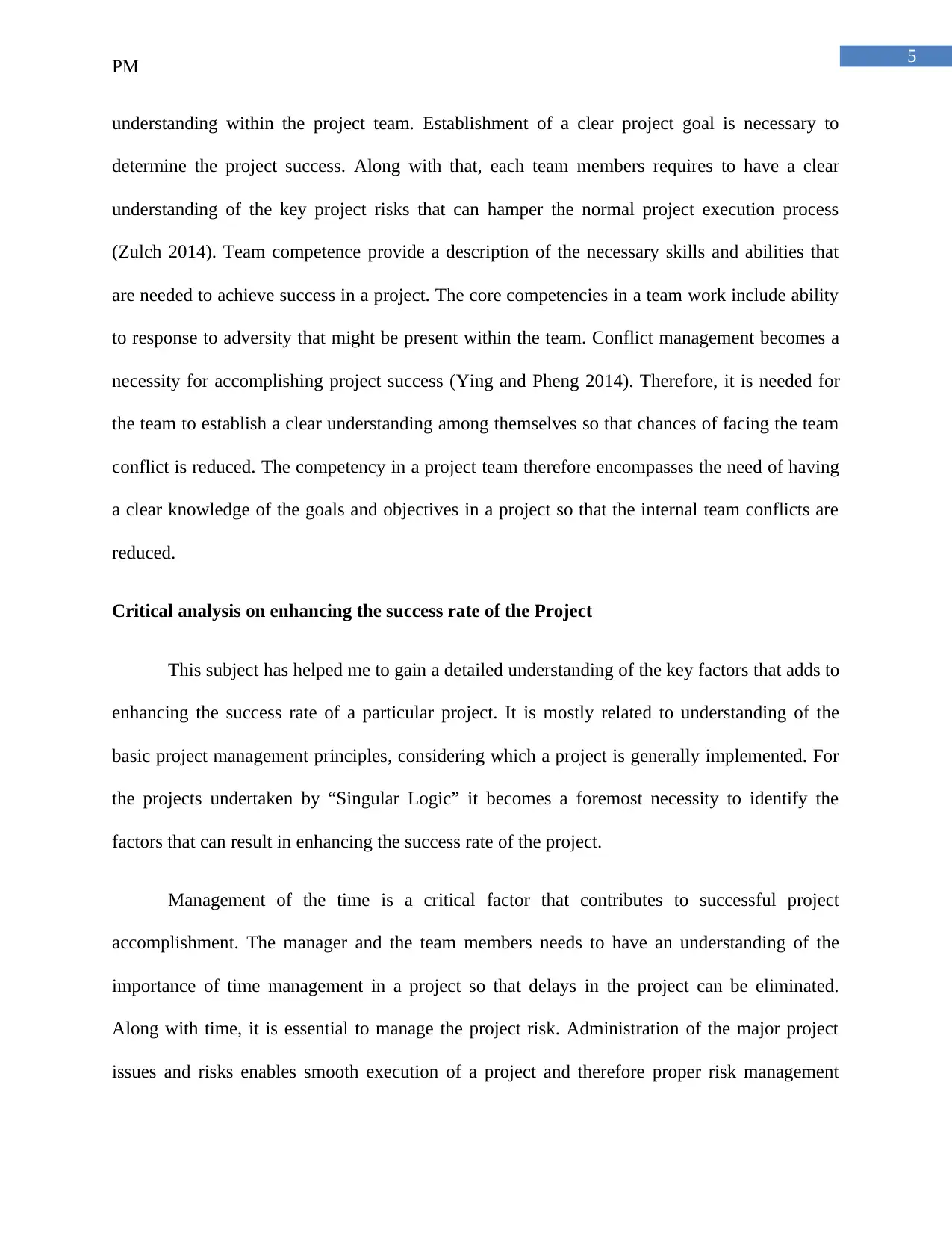
5
PM
understanding within the project team. Establishment of a clear project goal is necessary to
determine the project success. Along with that, each team members requires to have a clear
understanding of the key project risks that can hamper the normal project execution process
(Zulch 2014). Team competence provide a description of the necessary skills and abilities that
are needed to achieve success in a project. The core competencies in a team work include ability
to response to adversity that might be present within the team. Conflict management becomes a
necessity for accomplishing project success (Ying and Pheng 2014). Therefore, it is needed for
the team to establish a clear understanding among themselves so that chances of facing the team
conflict is reduced. The competency in a project team therefore encompasses the need of having
a clear knowledge of the goals and objectives in a project so that the internal team conflicts are
reduced.
Critical analysis on enhancing the success rate of the Project
This subject has helped me to gain a detailed understanding of the key factors that adds to
enhancing the success rate of a particular project. It is mostly related to understanding of the
basic project management principles, considering which a project is generally implemented. For
the projects undertaken by “Singular Logic” it becomes a foremost necessity to identify the
factors that can result in enhancing the success rate of the project.
Management of the time is a critical factor that contributes to successful project
accomplishment. The manager and the team members needs to have an understanding of the
importance of time management in a project so that delays in the project can be eliminated.
Along with time, it is essential to manage the project risk. Administration of the major project
issues and risks enables smooth execution of a project and therefore proper risk management
PM
understanding within the project team. Establishment of a clear project goal is necessary to
determine the project success. Along with that, each team members requires to have a clear
understanding of the key project risks that can hamper the normal project execution process
(Zulch 2014). Team competence provide a description of the necessary skills and abilities that
are needed to achieve success in a project. The core competencies in a team work include ability
to response to adversity that might be present within the team. Conflict management becomes a
necessity for accomplishing project success (Ying and Pheng 2014). Therefore, it is needed for
the team to establish a clear understanding among themselves so that chances of facing the team
conflict is reduced. The competency in a project team therefore encompasses the need of having
a clear knowledge of the goals and objectives in a project so that the internal team conflicts are
reduced.
Critical analysis on enhancing the success rate of the Project
This subject has helped me to gain a detailed understanding of the key factors that adds to
enhancing the success rate of a particular project. It is mostly related to understanding of the
basic project management principles, considering which a project is generally implemented. For
the projects undertaken by “Singular Logic” it becomes a foremost necessity to identify the
factors that can result in enhancing the success rate of the project.
Management of the time is a critical factor that contributes to successful project
accomplishment. The manager and the team members needs to have an understanding of the
importance of time management in a project so that delays in the project can be eliminated.
Along with time, it is essential to manage the project risk. Administration of the major project
issues and risks enables smooth execution of a project and therefore proper risk management
⊘ This is a preview!⊘
Do you want full access?
Subscribe today to unlock all pages.

Trusted by 1+ million students worldwide
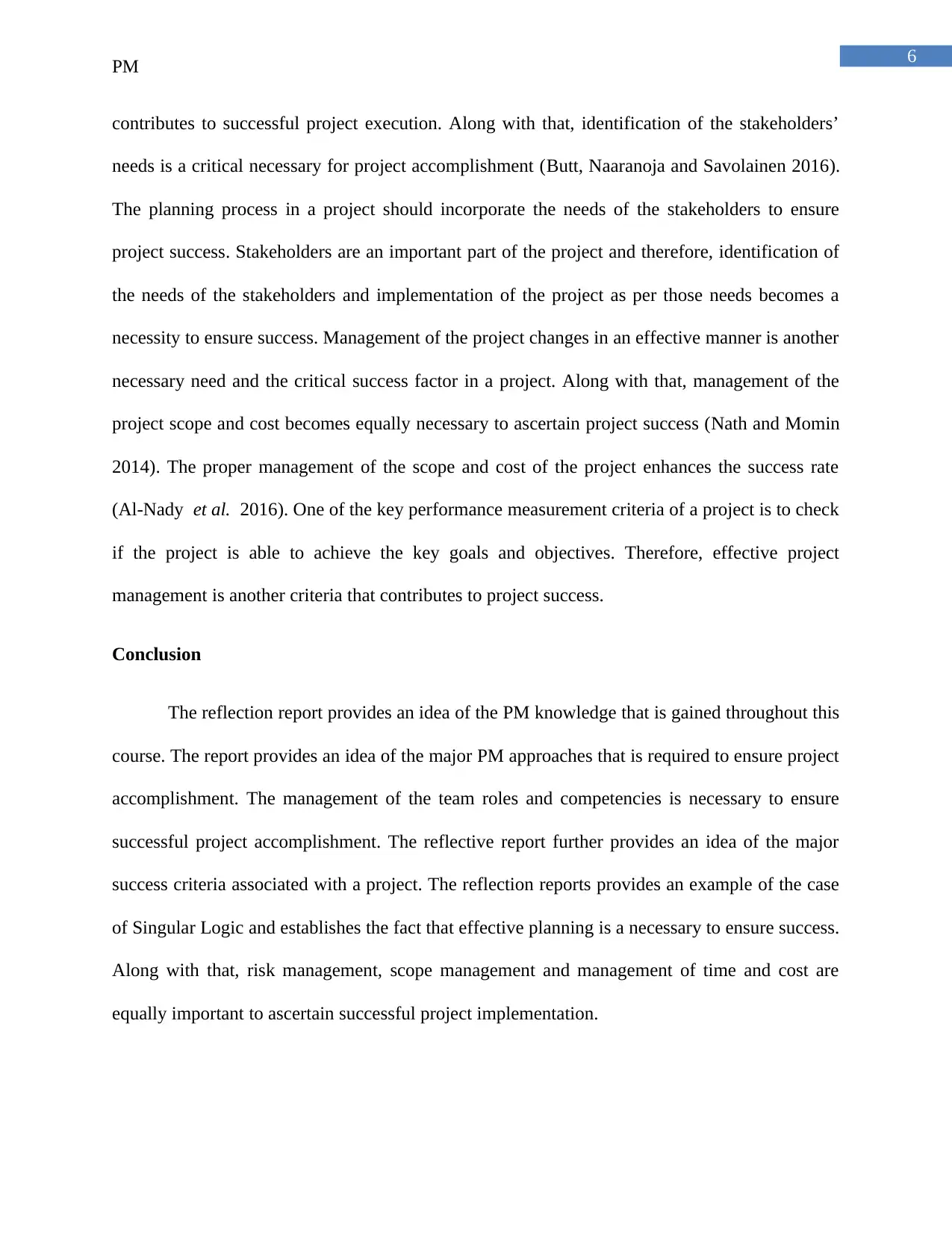
6
PM
contributes to successful project execution. Along with that, identification of the stakeholders’
needs is a critical necessary for project accomplishment (Butt, Naaranoja and Savolainen 2016).
The planning process in a project should incorporate the needs of the stakeholders to ensure
project success. Stakeholders are an important part of the project and therefore, identification of
the needs of the stakeholders and implementation of the project as per those needs becomes a
necessity to ensure success. Management of the project changes in an effective manner is another
necessary need and the critical success factor in a project. Along with that, management of the
project scope and cost becomes equally necessary to ascertain project success (Nath and Momin
2014). The proper management of the scope and cost of the project enhances the success rate
(Al-Nady et al. 2016). One of the key performance measurement criteria of a project is to check
if the project is able to achieve the key goals and objectives. Therefore, effective project
management is another criteria that contributes to project success.
Conclusion
The reflection report provides an idea of the PM knowledge that is gained throughout this
course. The report provides an idea of the major PM approaches that is required to ensure project
accomplishment. The management of the team roles and competencies is necessary to ensure
successful project accomplishment. The reflective report further provides an idea of the major
success criteria associated with a project. The reflection reports provides an example of the case
of Singular Logic and establishes the fact that effective planning is a necessary to ensure success.
Along with that, risk management, scope management and management of time and cost are
equally important to ascertain successful project implementation.
PM
contributes to successful project execution. Along with that, identification of the stakeholders’
needs is a critical necessary for project accomplishment (Butt, Naaranoja and Savolainen 2016).
The planning process in a project should incorporate the needs of the stakeholders to ensure
project success. Stakeholders are an important part of the project and therefore, identification of
the needs of the stakeholders and implementation of the project as per those needs becomes a
necessity to ensure success. Management of the project changes in an effective manner is another
necessary need and the critical success factor in a project. Along with that, management of the
project scope and cost becomes equally necessary to ascertain project success (Nath and Momin
2014). The proper management of the scope and cost of the project enhances the success rate
(Al-Nady et al. 2016). One of the key performance measurement criteria of a project is to check
if the project is able to achieve the key goals and objectives. Therefore, effective project
management is another criteria that contributes to project success.
Conclusion
The reflection report provides an idea of the PM knowledge that is gained throughout this
course. The report provides an idea of the major PM approaches that is required to ensure project
accomplishment. The management of the team roles and competencies is necessary to ensure
successful project accomplishment. The reflective report further provides an idea of the major
success criteria associated with a project. The reflection reports provides an example of the case
of Singular Logic and establishes the fact that effective planning is a necessary to ensure success.
Along with that, risk management, scope management and management of time and cost are
equally important to ascertain successful project implementation.
Paraphrase This Document
Need a fresh take? Get an instant paraphrase of this document with our AI Paraphraser

7
PM
PM
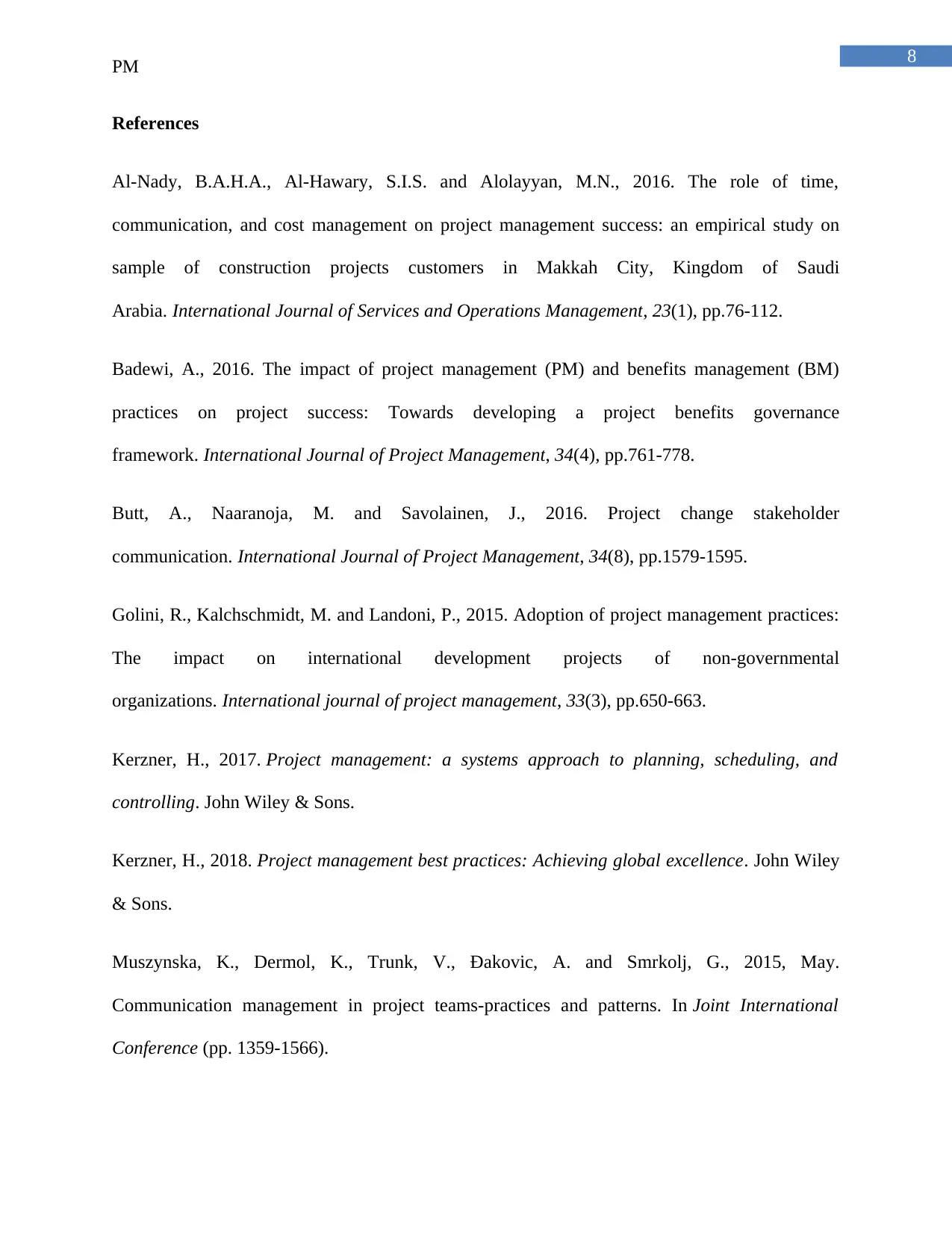
8
PM
References
Al-Nady, B.A.H.A., Al-Hawary, S.I.S. and Alolayyan, M.N., 2016. The role of time,
communication, and cost management on project management success: an empirical study on
sample of construction projects customers in Makkah City, Kingdom of Saudi
Arabia. International Journal of Services and Operations Management, 23(1), pp.76-112.
Badewi, A., 2016. The impact of project management (PM) and benefits management (BM)
practices on project success: Towards developing a project benefits governance
framework. International Journal of Project Management, 34(4), pp.761-778.
Butt, A., Naaranoja, M. and Savolainen, J., 2016. Project change stakeholder
communication. International Journal of Project Management, 34(8), pp.1579-1595.
Golini, R., Kalchschmidt, M. and Landoni, P., 2015. Adoption of project management practices:
The impact on international development projects of non-governmental
organizations. International journal of project management, 33(3), pp.650-663.
Kerzner, H., 2017. Project management: a systems approach to planning, scheduling, and
controlling. John Wiley & Sons.
Kerzner, H., 2018. Project management best practices: Achieving global excellence. John Wiley
& Sons.
Muszynska, K., Dermol, K., Trunk, V., Ðakovic, A. and Smrkolj, G., 2015, May.
Communication management in project teams-practices and patterns. In Joint International
Conference (pp. 1359-1566).
PM
References
Al-Nady, B.A.H.A., Al-Hawary, S.I.S. and Alolayyan, M.N., 2016. The role of time,
communication, and cost management on project management success: an empirical study on
sample of construction projects customers in Makkah City, Kingdom of Saudi
Arabia. International Journal of Services and Operations Management, 23(1), pp.76-112.
Badewi, A., 2016. The impact of project management (PM) and benefits management (BM)
practices on project success: Towards developing a project benefits governance
framework. International Journal of Project Management, 34(4), pp.761-778.
Butt, A., Naaranoja, M. and Savolainen, J., 2016. Project change stakeholder
communication. International Journal of Project Management, 34(8), pp.1579-1595.
Golini, R., Kalchschmidt, M. and Landoni, P., 2015. Adoption of project management practices:
The impact on international development projects of non-governmental
organizations. International journal of project management, 33(3), pp.650-663.
Kerzner, H., 2017. Project management: a systems approach to planning, scheduling, and
controlling. John Wiley & Sons.
Kerzner, H., 2018. Project management best practices: Achieving global excellence. John Wiley
& Sons.
Muszynska, K., Dermol, K., Trunk, V., Ðakovic, A. and Smrkolj, G., 2015, May.
Communication management in project teams-practices and patterns. In Joint International
Conference (pp. 1359-1566).
⊘ This is a preview!⊘
Do you want full access?
Subscribe today to unlock all pages.

Trusted by 1+ million students worldwide
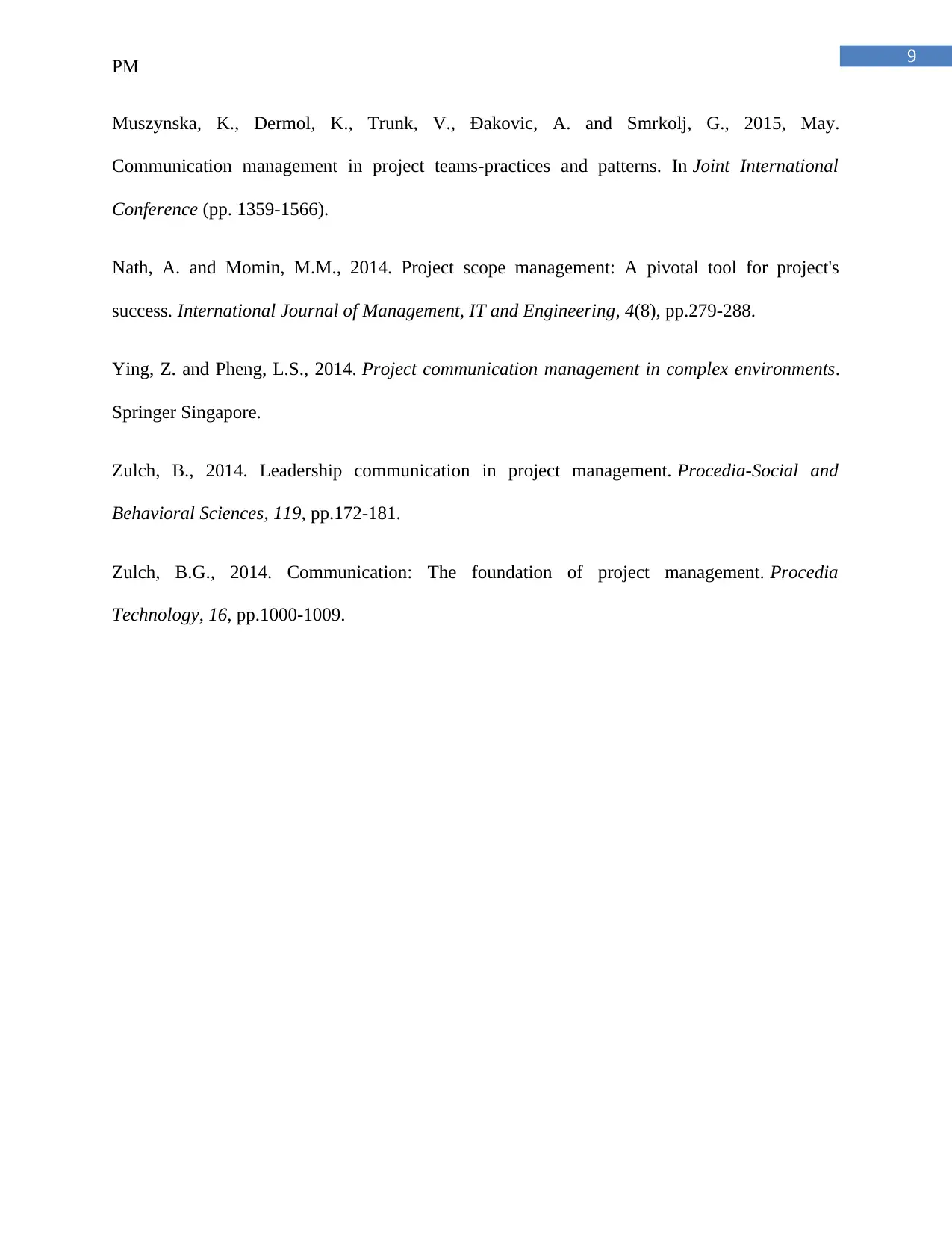
9
PM
Muszynska, K., Dermol, K., Trunk, V., Ðakovic, A. and Smrkolj, G., 2015, May.
Communication management in project teams-practices and patterns. In Joint International
Conference (pp. 1359-1566).
Nath, A. and Momin, M.M., 2014. Project scope management: A pivotal tool for project's
success. International Journal of Management, IT and Engineering, 4(8), pp.279-288.
Ying, Z. and Pheng, L.S., 2014. Project communication management in complex environments.
Springer Singapore.
Zulch, B., 2014. Leadership communication in project management. Procedia-Social and
Behavioral Sciences, 119, pp.172-181.
Zulch, B.G., 2014. Communication: The foundation of project management. Procedia
Technology, 16, pp.1000-1009.
PM
Muszynska, K., Dermol, K., Trunk, V., Ðakovic, A. and Smrkolj, G., 2015, May.
Communication management in project teams-practices and patterns. In Joint International
Conference (pp. 1359-1566).
Nath, A. and Momin, M.M., 2014. Project scope management: A pivotal tool for project's
success. International Journal of Management, IT and Engineering, 4(8), pp.279-288.
Ying, Z. and Pheng, L.S., 2014. Project communication management in complex environments.
Springer Singapore.
Zulch, B., 2014. Leadership communication in project management. Procedia-Social and
Behavioral Sciences, 119, pp.172-181.
Zulch, B.G., 2014. Communication: The foundation of project management. Procedia
Technology, 16, pp.1000-1009.
1 out of 10
Related Documents
Your All-in-One AI-Powered Toolkit for Academic Success.
+13062052269
info@desklib.com
Available 24*7 on WhatsApp / Email
![[object Object]](/_next/static/media/star-bottom.7253800d.svg)
Unlock your academic potential
Copyright © 2020–2026 A2Z Services. All Rights Reserved. Developed and managed by ZUCOL.





